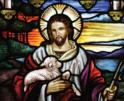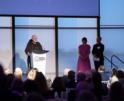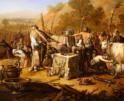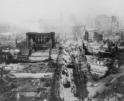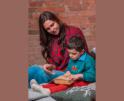
Culture
Gary and Grace Jansen won a well-deserved Christopher Award for their charming children's book, "Remember Us with Smiles" -- a beautifully illustrated celebration of family life that deserves a wide audience among your children and grandchildren.
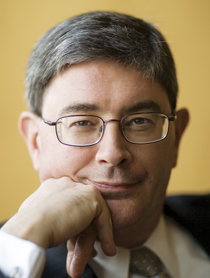
Weigel
Few of the following qualify as "beach reading;" they all qualify as good reading.
In graduate school, I was informed that there was no such thing as "biblical theology," only textual analysis. Bishop Robert Barron demonstrates what nonsense that was, and is, in "The Great Story of Israel: Election, Freedom, Holiness," a book that nourishes both mind and soul.
In "The Virtues," John Garvey, former president of the Catholic University of America, shares the wisdom by which he reminded CUA students that genuine "higher education" means "deeper formation" as well as "more information:" the perfect gift to anyone entering college or university this fall.
The culture wars continue. Three recent volumes help prepare 21st-century defenders of the faith for the work ahead -- "Religious Freedom after the Sexual Revolution," by leading pro-life legal scholar Helen M. Alvaré; "The Coming Christian Persecution: Why Things Are Getting Worse and How to Prepare for What Is to Come," by Thomas D. Williams; and "Tearing Us Apart: How Abortion Harms Everything and Solves Nothing," by my estimable colleagues, Ryan Anderson and Alexandra DeSanctis.
Don't let a formidable title -- "La Duchesse: The Life of Marie de Vignerot, Cardinal Richelieu's Forgotten Heiress Who Shaped the Fate of France" -- deter you from this impressive debut book by Bronwen McShea, a brilliant young historian who knows how to tell a story.
Lance Morrow, for decades one of the country's most felicitous essayists, looks back affectionately on his early days as an ink-stained wretch -- and draws some appropriately sharp contrasts to today's knights of the keyboard -- in a splendid memoir, "The Noise of Typewriters: Remembering Journalism."
A few months before his centenary, Henry Kissinger sketched lessons for the 21st century from six of the history-makers of the 20th in "Leadership: Six Studies in World Strategy," a book in which penetrating insight is leavened with tart wit ("The capacity for gratitude not being among de Gaulle's most highly developed traits...."). The chapter on Konrad Adenauer "strategy of humility" is especially pertinent to today's overheated politics.
Longtime Newsweek correspondent Andrew Nagorski continues the explorations into a dark period of history that he began with such page-turners as "Hitlerland: American Eyewitnesses to the Nazi Rise to Power" and "The Nazi Hunters" with "Saving Freud: The Rescuers Who Brought Him to Freedom": another example of popular historical writing at its best.
And while we're on the subject of the most extensively discussed of all human conflicts, Ryszard Tyndorf of the Catholic University of Lublin has produced a massive, free-to-download monograph that should make a considerable difference to both Holocaust Studies and current controversies within Poland, with "Wartime Rescue of Jews by the Polish Catholic Clergy: The Testimony of Survivors and Rescuers," available here.
"The Roman Mass: from Early Christian Origins to Tridentine Reform," by Uwe Michael Lang of the London Oratory, will be primarily of interest to scholars. But it should be required reading for Internet combatants in the ongoing liturgy wars, who would thereby learn a thing or two about the evolution of the Roman Rite through what the author rightly calls "centuries of intense religious, social, and cultural transformations."
Eduard Habsburg's "The Habsburg Way: Seven Rules for Turbulent Times" is a love letter to his (extensive) family from one of its prominent contemporary members, and a winsome exploration of some of the lesser-known dramas of European history.
Gary and Grace Jansen won a well-deserved Christopher Award for their charming children's book, "Remember Us with Smiles" -- a beautifully illustrated celebration of family life that deserves a wide audience among your children and grandchildren.
While never descending into hagiography, William Inboden's "The Peacemaker: Ronald Reagan, The Cold War, and the World on the Brink" sheds new light on the greatest American foreign policy success of the post-World War II period. Inboden's analysis should be of particular interest to U.S. Catholic historians willing to challenge (and correct) the regnant celebratory narrative about the U.S. bishops' involvement with nuclear weapons issues in the 1980s.
Given current confusions in American education, the category of "Classics Worth Re-Reading" is becoming the category of "Classics Worth Reading." For those who've lost touch with their literary inheritance -- or, worse, have been cheated out of it -- let me suggest Willa Cather's "Death Comes for the Archbishop" as the beginning a fresh encounter with great American literature. I recently re-read it on site, so to speak, in Santa Fe, New Mexico, and was struck again by Cather's limpid prose, sacramental sensibility and empathy with her characters.
- George Weigel is Distinguished Senior Fellow of the Ethics and Public Policy Center in Washington, D.C.
Recent articles in the Culture & Events section
-
The example of the Good ShepherdMichael Reardon
-
Spring Celebration Gala will honor Cardinal O'MalleyShannon Lyons
-
Scripture Reflection for April 28, 2024, Fifth Sunday of EasterDeacon Greg Kandra
-
Boston and the nation respond to the San Francisco Earthquake of 1906Thomas Lester
-
See you in the storyLaura Kelly Fanucci

